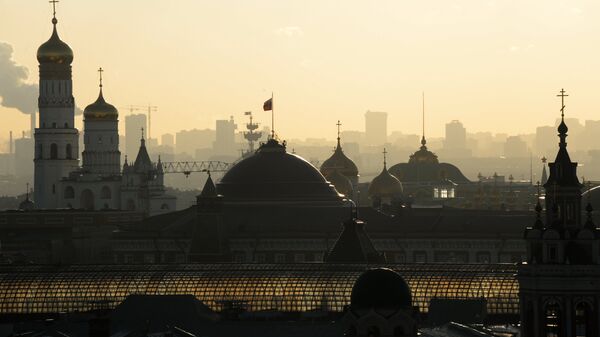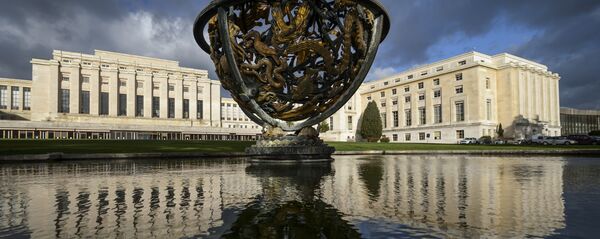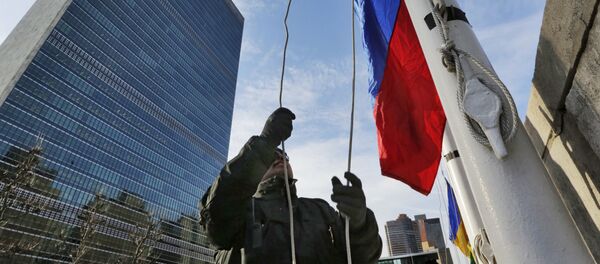The White House's recent statement that the US has managed to "isolate" Russia at the United Nations "through successful diplomacy with China" has raised questions.
"[The United States] further isolated Syria and Russia at the United Nations through successful diplomacy with President Xi Jinping of China," the report said Thursday, apparently referring to China's abstention during an April 12 vote on the UN Security Council draft resolution condemning the suspected use of chemical weapons in the Syrian province of Idlib.
"I'd like to point out the abstention of China, on the heels of President Xi's recent successful visit," White House Press Secretary Sean Spicer said April 13, commenting on the matter.
Earlier Spicer claimed "there is no question that Russia is isolated."
However, it appears that the White House's stance is nothing but wishful thinking.
In response to Washington's recent statement, Gui Congyou, the head of China's Ministry of Foreign Affairs Department of European-Central Asian Affairs, emphasized that the Sino-Russian partnership has a serious potential.
"This is the opinion of the US," Gui told reporters, "Our [Sino-Russian] relations have a very serious potential for cooperation."
"No matter how the international situation changes, our policy of developing and deepening our bilateral partnership and strategic cooperation will remain intact," Gui stressed.
The Chinese media outlet People's Daily (Renmin Ribao) reported Friday that the Russian Asian Union of Industrialists and Entrepreneurs (RAUIE) has held a Sino-Russian summit within the framework of Network-session "Dialogues" project.
The meeting brought together Russian businessmen and regional leaders as well as representatives of Chinese financial institutions and real sector companies. The participants discussed prospects for theimplementation of joint investment projects.
The media outlet also noted that on April 27 Major General Shao Yuanming, Deputy Chief of the Chinese Joint Staff Department, and chief of the Russian General Staff's Main Operational Directorate Col. Gen. Sergei Rudskoi held the 19th round of strategic consultation in Russia.
Speaking at a regular press briefing Thursday, Senior Colonel Yang Yujun, spokesman for China's Ministry of National Defense, specified that Beijing is willing to push forward the Sino-Russian mil-to-mil relationship.
"The relationship between the Chinese and Russian militaries shows the high level of strategic mutual trust and strategic coordination. It is also a symbol of the determination by the two countries to cope together with new threats and challenges and commonly maintain regional security and stability," Col. Yang told reporters.
Simultaneously the Chinese and Russian diplomats are making efforts to resolve Northeast Asia's most longstanding conundrum.
On Thursday night, Chinese Foreign Minister Wang Yi held a meeting with Russian Deputy Foreign Minister Gennady Gatilov on the Korean Peninsula nuclear issue.
Citing Wang, Xinhua emphasized that China and Russia "share a strategic partnership of comprehensive coordination, and the two sides have maintained close communication and coordination on international and regional affairs."
The Chinese Foreign Minister added that Beijing's vision of a "two-track approach" and "double suspension" coincided with that of Moscow. He stressed the two countries will continue to maintain close cooperation in order to resolve the looming Korean crisis.
Commenting on the White House's remark on Moscow's "isolation," Russian political analyst and expert in American studies Mikhail Sinelnikov-Orishak told Radio Sputnik that one shouldn't take this statement seriously.
"When [the Americans] hold elections they see us (according to their own statements) as a large and influential power capable of 'forcing' them to choose a president we like. In another moment it becomes profitable for them to see us as a country 'torn to pieces' and located 'in the backyard of history.' There is no need to refute such statements; one shouldn't challenge them — they should be perceived with a smile," Sinelnikov-Orishak said.




